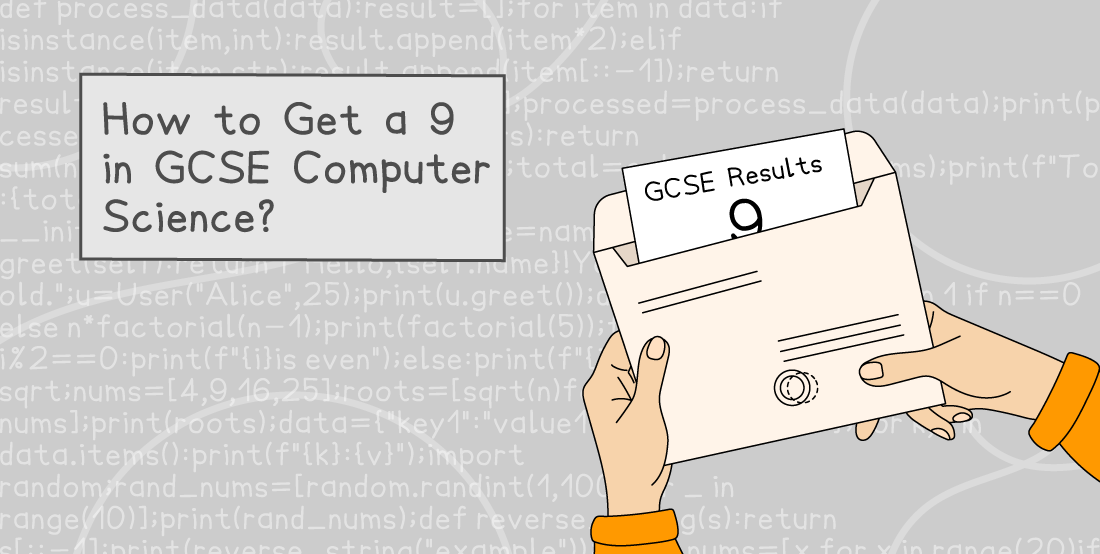How to Get a 9 in GCSE Computer Science
Written by: Robert Hampton
Reviewed by: James Woodhouse
Published

Contents
Want to get a grade 9 in GCSE Computer Science? You’ll need more than just good revision habits. This guide gives you the top strategies that high-scoring students use to ace both papers. Whether you’re already on track for a grade 8 or trying to boost your current grade, these tips will help you hit the top mark.
Learn the theory by topic, not just chapter
In GCSE Computer Science, Paper 1 covers Computer Systems and Paper 2 covers Computational Thinking and Programming. You need to master both, but each requires a slightly different approach.
For Paper 1, focus on definitions, processes, and applications
For Paper 2, focus on logic, algorithms, and writing code
Use the mark schemes to see exactly how keywords are rewarded in theory answers.
Practice your programming logic regularly
In Paper 2, you’ll need to solve problems using pseudocode or Python. Students aiming for grade 9 don’t just learn theory, they practise how to think like a programmer.
WHILE valid = FALSE
INPUT password
IF password LENGTH >= 8 THEN
valid = TRUE
ELSE
OUTPUT "Try again"
ENDIF
ENDWHILE
Create small programs that use loops, IF statements, and lists. Focus on structure and clarity.
Master the exam language
Top-grade students understand exactly what each question is asking. Words like "describe," "explain," and "compare" each require different answers.
Keep a glossary of command words and what they expect
Highlight them in past papers as part of your revision
Write answers using keywords and full sentences
Use a structure like Point, Example, Reason to keep long answers focused.
Use past papers from day one
Don’t save past papers for the final few weeks. Use them as a learning tool from the start of Year 11.
Do one question at a time and mark it yourself
Compare your answer to the mark scheme
Record how many marks you get and which topics you struggle with
Aim to complete one past paper per fortnight leading up to the final term.
Common Mistakes to Avoid
1. Only revising theory topics
It’s common for students to spend too much time revising topics like the CPU, memory, and networks while neglecting the practical parts of the course. However, Paper 2 is just as important and includes logic, pseudocode, and programming.
Make sure you practise both theory and programming regularly. Build your coding skills by writing small programs and working through logic puzzles so you’re fully prepared for both exams.
2. Not understanding command words
Words like "state", "explain", and "evaluate" appear in almost every question, and each one requires a different type of answer. If you don’t understand what the question is asking, you could lose marks even if you know the content.
Get familiar with command words early in your revision. Keep a list of what each one means and practise using them in past paper questions to improve your exam technique.
3. Leaving past paper practice too late
Many students wait until the final few weeks to start using past papers. This means they miss out on the chance to understand the exam format, improve their timing, and learn from their mistakes.
Start using past papers early in Year 11. Do one question at a time, mark it with the official mark scheme, and keep track of where you lose marks. This will make a huge difference to your final grade.
Boost Your Grades With Save My Exams
Feeling stressed ahead of your exams? Join over 1.5 million students who use Save My Exams, the leading online revision platform.
On average, students who use Save My Exams improve by two grades thanks to our comprehensive resources. From past papers and revision notes to exam-style questions tailored to your specific course, our revision tools help you to study smarter, not harder.
Created by teachers and examiners who know exactly what you need to revise to achieve the best grades, our resources help students to save time and get straight to the content you need.
Sign up for articles sent directly to your inbox
Receive news, articles and guides directly from our team of experts.

Share this article


 written revision resources that improve your
written revision resources that improve your